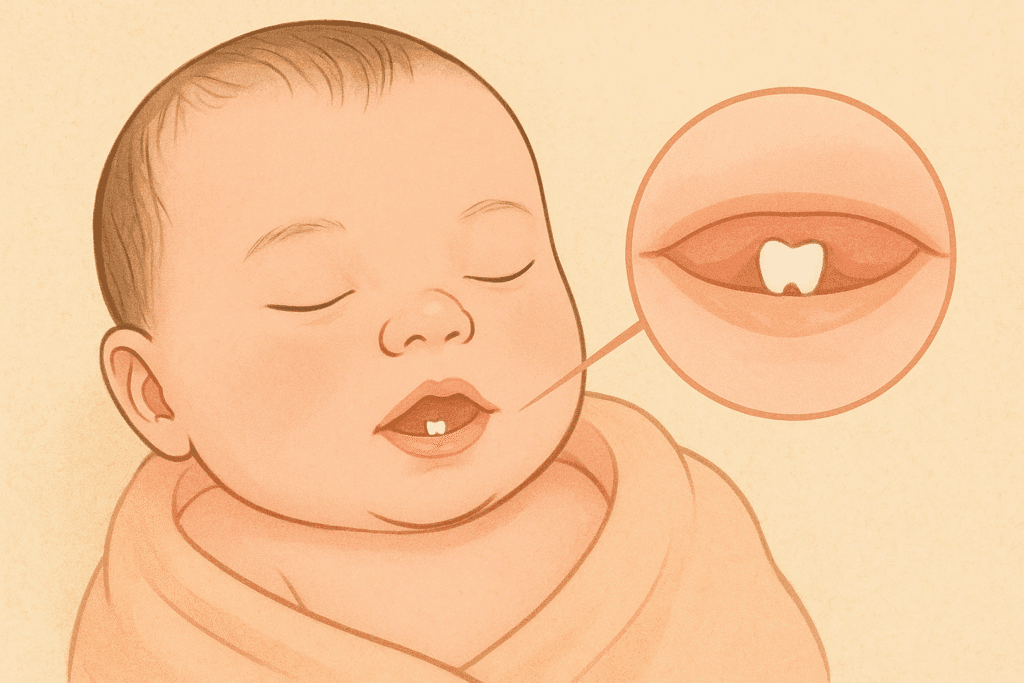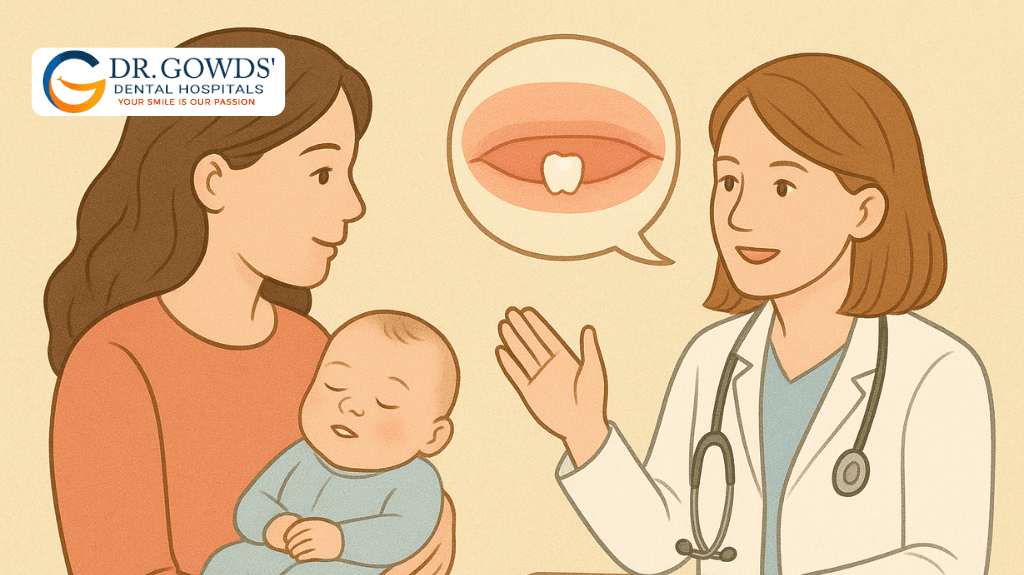Most new parents expect their baby’s first tooth to appear around six months of age. So, when a newborn arrives already sporting a tiny white tooth, it can be quite a surprise. These early-appearing teeth are called natal teeth (present at birth) or neonatal teeth (erupting within the first month of life).
Though rare—occurring in about 1 in every 2,000 to 3,000 births—neonatal teeth have fascinated doctors, parents, and even folklore for centuries. For parents today, the appearance of these early teeth can bring both curiosity and concern.
In this article, we’ll explore everything parents need to know about neonatal teeth: why they appear, whether they’re harmful, treatment options, myths vs. facts, and expert guidance from Dr. Gowds Dental Hospitals, one of the trusted names in kids dentistry in hyderabad.
What Are Natal and Neonatal Teeth?

- Natal teeth: Present at birth.
- Neonatal teeth: Erupt within the first 30 days after birth.
In most cases, these teeth are part of the normal set of 20 baby teeth, but they emerge much earlier than usual. Rarely, they may be extra teeth, called supernumerary teeth.
The majority are found in the lower front gum area (mandibular central incisors), which is also where the first baby teeth usually appear later in infancy.
Why Do Neonatal Teeth Occur?
The exact cause isn’t always clear, but several factors contribute to their appearance:
- Superficial tooth germs: Tooth buds are positioned closer to the gum surface than usual.
- Genetic factors: If a parent had them, their child may also develop them. Studies show a familial tendency.
- Associated syndromes: Rarely linked to genetic conditions such as Ellis-van Creveld syndrome.
- Environmental or nutritional factors: Maternal health during pregnancy may play a role.
At Dr Gowds Dental Hospitals, pediatric specialists note that while many neonatal teeth are harmless, professional evaluation is essential to prevent feeding difficulties and ensure long-term oral health.
Are Neonatal Teeth Harmful?
Not always. Many neonatal teeth are harmless and remain stable. However, some complications can occur:
- Mobility and aspiration risk: Teeth with underdeveloped roots may be loose and at risk of falling out.
- Feeding difficulties: Sharp neonatal teeth may cause discomfort during breastfeeding.
- Oral irritation: The baby’s tongue may develop ulcers, known as Riga-Fede disease.
- Parental anxiety: The unusual appearance can lead to stress.
Parents in Hyderabad often consult kids dentistry specialists to decide whether to monitor or remove neonatal teeth safely.
What Should Parents Do?
The first step is always to consult a pediatric dentist. At Dr Gowds Dental Hospitals, pediatric dental experts evaluate:
- Whether the tooth is part of the normal primary dentition.
- If it is stable or loose.
- Whether it’s causing feeding issues or oral irritation.
Management Options
- Conservative care: If the tooth is stable, harmless, and not interfering with feeding, no treatment is needed.
- Extraction: If the tooth is very loose, painful, or causing feeding problems, removal is recommended.
For families seeking kids dentistry in Hyderabad, early dental visits ensure the safest and most effective treatment.
Myths and Cultural Beliefs
For centuries, neonatal teeth were surrounded by myths:
- In some cultures, they were thought to bring bad luck.
- In others, they were considered a sign of greatness or good fortune.
Science shows they are simply a biological variation—neither lucky nor unlucky. Clinics such as Dr Gowds Dental Hospitals help parents focus on facts, not fears.
How Common Are Neonatal Teeth?
- Occurrence: About 1 in every 2,000–3,000 births.
- Location: Around 85% appear in the lower front gums.
- Gender: Slightly more common in females.
Practical Tips for Parents
- Schedule an early dental visit at a trusted pediatric dental clinic.
- Monitor feeding and consult a lactation expert if needed.
- Protect against tongue ulcers—dentists can smooth rough edges.
- Maintain oral hygiene by wiping the baby’s gums with a damp cloth.
- Choose expert care in Hyderabad—Dr Gowds Dental Hospitals provides reliable kids dentistry services for early dental concerns.


FAQs About Root Canal Treatment
Do neonatal teeth mean early teething?
No, they don’t change the overall teething timeline.
Does extraction affect permanent teeth?
No, removal does not harm future permanent teeth.
Can neonatal teeth decay?
Yes, enamel may be thinner, so cleaning is important.
Can I continue breastfeeding?
Yes, with adjustments and support from specialists.
Should neonatal teeth always be extracted?
No, only if they are loose or causing issues.
Where can I find the best kids dentistry in Hyderabad?
Dr Gowds Dental Hospitals is among the most trusted names for pediatric dental care, offering expert guidance on neonatal teeth and other oral health needs.
